
Speaker and Panelist Biographies
The Breaching Borders: State Encroachment into the Federal Immigration Domain? Symposium will be held Thursday and Friday, October 20-21, 2011 at the Bradbury Thompson Alumni Center on the Washburn University campus. The symposium is sponsored by the Washburn University School of Law Center for Law and Government and the Washburn Law Journal.
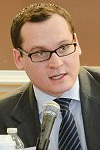 Patrick J. Charles — Historian, U.S. Air Force 352nd Special Operations Group
Patrick J. Charles — Historian, U.S. Air Force 352nd Special Operations Group
Patrick J. Charles received a B.A. in History and International Affairs with honors from George Washington University and a J.D. from Cleveland-Marshall School of Law. He is the recipient of the 2008 Judge John R. Brown Award for Excellence in Legal Writing and a former sergeant with Marine Security Guard Battalion. Charles was a legal analyst for the Immigration Reform Law Institute where he specialized in constitutional analysis, legal scholarship, and Supreme Court of the United States advocacy. His research and historical analysis have been the basis of multiple amicus curiae briefs, including the Supreme Court cases Flores-Villar v. U.S., Chamber of Commerce v. Whiting, and McDonald v. City of Chicago. He is the author of numerous law review articles on history, constitutional interpretation, and standards of review, including two on immigration: "The Plenary Power and the Constitutionality of Ideological Exclusion: An Historical Perspective," 15 Texas Review of Law & Politics 61 (2010) and "Representation Without Documentation?: Unlawfully Present Aliens, Apportionment, the Doctrine of Allegiance and the Law," 25 BYU Journal of Public Law 35 (2011). He currently serves as a historian for the 352nd Special Operations Group at RAF Mildenhall, United Kingdom, and independently assists the federal government, states, and municipalities in legislation and civil rights defense litigation. His forthcoming article "Decoding the Fourteenth Amendment's Citizenship Clause: Unlawful Immigrants, Allegiance, Personal Subjection, and the Law" will be published for the symposium edition of the Washburn Law Journal.
 Nora V. Demleitner — Dean and Professor of Law, Hofstra University School of Law
Nora V. Demleitner — Dean and Professor of Law, Hofstra University School of Law
Dean Demleitner has served as dean of Hofstra University School of Law since January 2008. She first joined the law school in 2001 as professor of law, and was named vice dean for academic affairs before being appointed interim dean in 2007. She has taught and written extensively in the areas of criminal, comparative, and immigration law, and specializes in sentencing and collateral sentencing consequences. She regularly speaks on sentencing matters and issues related to legal education, and has lectured extensively in Europe.
Demleitner has served as a visiting professor at the University of Michigan Law School, the University of Freiburg Germany, St. Thomas University School of Law in Miami, and Sant' Anna Institute of Advanced Research in Pisa, Italy. She is managing editor of and a contributor to the Federal Sentencing Reporter, University of California Press. She is the lead author of Sentencing Law and Policy, a major casebook on sentencing law, published by Aspen Law and Business. Her articles have been published in the Stanford, Michigan, and Minnesota law reviews, among others.
Demleitner received a bachelor's degree in American Studies: Social and Political Issues from Bates College in Lewiston, Maine; a law degree from Yale Law School, New Haven, Connecticut; and a master of laws with distinction in international and comparative law from Georgetown University Law Center, Washington, D.C. After graduation from law school, Demleitner clerked for The Honorable Samuel A. Alito Jr., then a member of the U.S. Court of Appeals for the Third Circuit. She testified before the U.S. Senate on behalf of Justice Alito's nomination to the U.S. Supreme Court. She was a visiting researcher at the Max Planck Institute for Foreign and International Criminal Law in Germany.
She is an elected member of the American Law Institute and a Fellow of the American Bar Foundation.
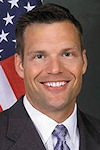 Kris W. Kobach — Secretary of State for Kansas
Kris W. Kobach — Secretary of State for Kansas
Kris Kobach was sworn in as the 31st Kansas Secretary of State in January 2011. Before that, he was a professor of law at the University of Missouri-Kansas City from 1996 to 2011 specializing in constitutional law, election law, legislation, and immigration law.
Kobach co-authored Arizona's SB 1070 Illegal Immigration Law and assisted Arizona in the drafting and defense of that law, as well as other statutes designed to stop illegal immigration. He served as a constitutional attorney defending cities against illegal immigration lawsuits, including Haselton, Pennsylvania; Valley Park, Missouri; and Farmers Branch, Texas.
In 2001, Kobach was awarded a White House fellowship, which took him to Washington, D.C., to work for the Bush Administration in the office of the U.S. Attorney General. Kobach was counsel to U.S. Attorney General John Ashcroft from 2001 to 2003, serving as chief advisor on immigration law and border security. He was the architect of anti-terrorism programs after 9/11, including the National Security Entry-Exit Registration System that registers and fingerprints high-risk visitors to the United States. Kobach also led U.S. Department of Justice reforms of the immigration court system, resulting in the reshaping of the Board of Immigration Appeals in 2002.
He hosts the Kris Kobach Show on KCMO 710 AM Radio each Sunday from 6 to 8 p.m. and has been a regular guest on national cable news programs. He contributes to various publications and has authored several scholarly articles on elections, political science, constitutional law, and immigration law. He authored The Referendum: Direct Democracy in Switzerland (Dartmouth, 1993), a book on elections and ballot issues.
He earned his bachelor's degree with highest distinction from Harvard University; his doctorate in Political Science from Oxford University in England; and his law degree from Yale Law School. Kobach served as a law clerk to Judge Deanell Reece Tacha of the United States Court of Appeals for the 10th Circuit.
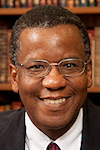 Reginald Robinson — Professor of Law, Washburn University School of Law; Co-organizer of Breaching Borders Symposium
Reginald Robinson — Professor of Law, Washburn University School of Law; Co-organizer of Breaching Borders Symposium
Professor Robinson is director of the Center for Law and Government at Washburn Law. Before joining Washburn Law, Robinson served as president and chief executive officer of the Kansas Board of Regents. Before that, he was chief of staff to the University of Kansas (KU) chancellor and was a visiting associate professor in the KU School of Law, where he taught civil rights, criminal law, torts, and local government law courses.
Robinson joined the U.S. Department of Justice in 1993 as a White House Fellow, and in that capacity served as a special assistant to Attorney General Janet Reno. He then was appointed to a number of senior executive posts. As deputy assistant attorney general for the Office of Justice Programs (OJP) he led the attorney general's effort to coordinate the department's involvement in a number of community-based public safety initiatives, including Project PACT (Pulling America's Communities Together), Operation Weed and Seed, and the Clinton Administration's Empowerment Zone Initiative. He also led the OJP's effort to implement the 1994 Crime Act's Drug Courts Program.
After two years at OJP, Robinson was appointed deputy associate attorney general of the United States, where he was a key advisor to the associate attorney general on environmental, civil rights, and justice programs matters. His work on a proposed victims' rights amendment to the United States Constitution led to an appointment as acting director of the Office for Victims of Crime (OVC), the federal government's lead agency for addressing issues facing the nation's crime victims.
Before attending law school Robinson served four years as a field artillery officer in the United States Army and was honorably discharged at the rank of captain. He earned his undergraduate and law degrees from the University of Kansas. While in law school, he was editor in chief of the University of Kansas Law Review. Upon graduation Professor Robinson was a law clerk to Judge Deanell R. Tacha, of the U.S. Court of Appeals for the Tenth Circuit.
 Rachel E. Rosenbloom — Assistant Professor of Law, Northeastern University School of Law
Rachel E. Rosenbloom — Assistant Professor of Law, Northeastern University School of Law
As assistant professor of law at Northeastern University School of Law, Professor Rosenbloom teaches courses on immigration law, refugee and asylum law, the constitutional rights of noncitizens, and administrative law. She also serves on the law school's faculty for the Program on Human Rights and the Global Economy.
Before joining Northeastern, Rosenbloom was a fellow at the Center for Human Rights and International Justice at Boston College, where she was the supervising attorney for the Center's Post-Deportation Human Rights Project. She was an adjunct professor at Bentley University, Waltham, Massachusetts, in the Department of Law, Taxation, and Financial Planning, teaching upper-level undergraduate courses on race and the law. Her legal career includes practicing union-side labor law at the Boston firm of Segal Roitman LLP. She also served as a law clerk to The Honorable Morris E. Lasker in U.S. District Court. Before pursuing a legal career, Rosenbloom was a research and advocacy associate at the International Gay and Lesbian Human Rights Commission, where she documented human rights violations based on sexual orientation, gender identity, and HIV status.
She testified before the U.S. House of Representatives Subcommittee on the immigration hearing, "Problems with ICE Interrogation, Detention, and Removal Procedures," and has been widely quoted in the media on the wrongful detention and deportation of U.S. citizens and permanent residents.
Rosenbloom received her bachelors' degree in history, magna cum laude, from Columbia University, New York. She earned a master's degree in history from the University of California, Berkley, earning honors as a regent's scholar and human rights fellow at the Townsend Center for the Humanities. She graduated magna cum laude from New York University School of Law where she was a member of the Order of the Coif, and served as articles selection editor and staff editor for the New York University Review of Law and Social Change.
She writes in the area of immigration law and policy, and her current research interests focus on deportation, citizenship, the immigration consequences of criminal convictions, and LGBT asylum claims.
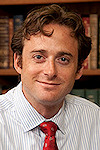 David S. Rubenstein — Associate Professor of Law, Washburn University School of Law; Co-organizer of Breaching Borders Symposium
David S. Rubenstein — Associate Professor of Law, Washburn University School of Law; Co-organizer of Breaching Borders Symposium
Professor Rubenstein joined Washburn University School of Law after teaching Civil Procedure, Administrative Law, Immigration Law, and Lawyers' Ethics at Hofstra University School of Law. Rubenstein's scholarship focuses on the balance of government powers in immigration and administrative law. His articles have appeared in the William & Mary Law Review, Harvard Journal on Legislation, and Administrative Law Review.
Before teaching at Hofstra he clerked for The Honorable Sonia Sotomayor when she was a judge on the United States Court of Appeals for the Second Circuit and for The Honorable Barbara Jones in the United States District Court for the Southern District of New York.
Rubenstein earned his undergraduate degree from Buffalo University and his law degree from Hofstra University. After graduation from law school, Rubenstein worked for five years as an associate in King & Spalding's New York office, where he represented major corporate clients in a wide array of commercial litigation matters. He then served for three years as an assistant United States attorney in the Southern District of New York, where he specialized in immigration matters and argued several issues of first impression before the Second Circuit Court of Appeals.
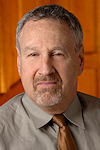 Peter H. Schuck — Simeon E. Baldwin Professor Emeritus of Law and Professor (Adjunct) of Law, Yale Law School
Peter H. Schuck — Simeon E. Baldwin Professor Emeritus of Law and Professor (Adjunct) of Law, Yale Law School
Professor Schuck has taught at Yale University, New Haven, Connecticut, since 1979 in various capacities, including serving as the Simeon E. Baldwin Professor Emeritus of Law since 1986. His teaching and research focus on tort law; immigration, citizenship, and refugee law; groups, diversity, and law; and administrative law.
He earned a bachelor's degree from Cornell University, Ithaca, New York; a law degree from Harvard Law School, Cambridge, Massachusetts; a master of laws in international law from New York University Law School; and a master's degree in government from Harvard University.
He began his law career in private practice in New York City and has worked in public interest law in Washington, D.C., with Consumers Union and the Center for Study of Responsive Law. He also served as principal deputy assistant secretary for Planning and Evaluation for the U.S. Department of Health, Education and Welfare.
A prolific writer of short essays, poems, commentaries, op-eds, books, articles, and chapters, Schuck is currently working on "U.S. Citizenship: Contemporary Challenges and Future Directions," in Beyond Exceptionalism: Immigration in Postwar Germany and the United States. His books include Understanding America: The Anatomy of an Exceptional Nation (co-editor with James Q. Wilson) (Public Affairs/Perseus, 2008) and Targeting in Social Programs: Avoiding Bad Bets, Removing Bad Apples (Brookings Institution Press, 2006) (with Richard J. Zeckhauser), which received honorable mention for Charles Levine Prize for best book in Comparative Policy and Administration. Schuck has been a contributing editor to The American Lawyer since 1998, and received the National Gold Award for Regular Columnist from the American Society of Business Publication Editors.
He has been appointed to visiting professorships at European University Institute in Florence, Italy; New York University School of Law; Scuola Superiore Di Studi Universitari E Di Perfezionamento S. Anna in Pisa, Italy; Georgetown University Law Center; and American Enterprise Institute for Public Policy Research.
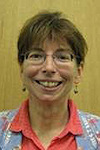 Margaret Stock — Adjunct Instructor, University of Alaska Anchorage, Department of Political Science
Margaret Stock — Adjunct Instructor, University of Alaska Anchorage, Department of Political Science
Professor Stock has been a litigator and immigration and citizenship lawyer in Alaska since 1993. She is also an adjunct instructor at the University of Alaska Anchorage, in the Department of Political Science, where she has taught Introduction to American Government and currently teaches National Security Law and Policy.
Stock served in the Military Police Corps, U.S. Army Reserve, for 28 years and transferred to the organization's Retired Reserve in June 2010. She taught constitutional and military law, national security law, and comparative law at the U.S. Military Academy, West Point, New York, where she was named a master teacher by the U.S. Military Academy Master Teacher Program.
Stock continues to focus her academic and professional attention on the connection between immigration and national security. From January 2008 until her retirement from the Army in June 2010, she worked on the Military Accessions Vital to the National Interest program. She was a visiting fellow at the Border Policy Research Institute at Western Washington University and recently concluded service as a member of the Council on Foreign Relations Independent Task Force on U.S. Immigration Policy.
While attending Harvard Law School, she served as editor-and-chief of the Harvard Journal of Law and Public Policy. She received her bachelor's degree from Harvard-Radcliffe and her master's in public administration from Harvard Kennedy School. She also earned a master of strategic studies from the Army War College.
Stock has received numerous awards for her service, including the Legion of Merit, Joint Service Commendation Medal, Meritorious Service Medal, and Outstanding Military Volunteer Medal. In 2008 she received the American Immigration Lawyers Association Pro Bono Award, and was the 2005 recipient of the American Immigration Lawyers Association Advocacy Award. She is a member of the American Bar Association Commission on Immigration. Stock is a nationally recognized expert in issues related to immigration and citizenship law and has testified on these issues before Congress.
 Juliet Stumpf — Professor of Law, Lewis & Clark Law School
Juliet Stumpf — Professor of Law, Lewis & Clark Law School
Professor Stumpf teaches civil procedure, employment discrimination, and immigration and citizenship law at Lewis & Clark Law School, Portland, Oregon. Her legal scholarship examines the relationships between immigration law and other substantive areas of law including criminal law, national security law, civil rights, and employment law.
Before joining the Lewis & Clark Law School faculty in 2005, Stumpf was acting assistant professor in the Lawyering Program at New York University School of Law. She previously clerked for The Honorable Richard A. Paez on the U.S. Court of Appeals for the Ninth Circuit. In practice, she was a senior trial attorney in the Civil Rights Division of the U.S. Justice Department where she litigated employment discrimination claims and advocated increased civil rights protections on behalf of immigrants and U.S. citizens of color. She also served on an interagency task force crafting regulations to implement the Victims of Trafficking and Violence Protection Act of 2000. Twice she earned special commendation awards for policy work on human trafficking regulations and civil rights work on government agency treatment of immigrants.
As an associate attorney with Morrison and Foerster, a firm in Palo Alto, California, and Washington, D.C., Stumpf litigated intellectual property and antitrust cases. She also served as the firm's Washington pro bono coordinator and representative to the Washington Lawyer's Committee for Civil Rights and Urban Affairs and the Washington Lawyers Committee for Human Rights (now known as Human Rights First).
Stumpf serves on the advisory board of the International Journal of Constitutional Law. She received her bachelor's degree from Oberlin College, Oberlin, Ohio, and her law degree, cum laude, from Georgetown University Law Center, Washington, D.C. While attending law school, she was a notes and comments editor for the Georgetown Law Journal. She is a member of the Washington, D.C. and California bar associations.
 Rick Su — Associate Professor of Law and Director of Law Journals, University at Buffalo Law School
Rick Su — Associate Professor of Law and Director of Law Journals, University at Buffalo Law School
Professor Su is an associate professor and director of law journals at the University at Buffalo Law School, Buffalo, New York, where he received the Faculty Teaching Award in 2009. He has taught courses in local government law, immigration law, refugee and asylum law, property, and zoning and land use law.
Su has moderated and presented at various workshops on immigration law, including the Immigration Law Teachers Workshop at DePaul Law School in 2010, and the Law Immigration and Criminality Symposium at the University of California Berkeley Law School in 2010.
He has authored numerous articles in the areas of immigration and local government law including his recently published "Immigration as Urban Policy," 38 Fordham Urban Law Review. In 2010, his commentary, "The Overlooked Significance of Arizona's New Immigration Law," was published in the Michigan Law Review's First Impressions.
He earned a bachelor's degree, magna cum laude, from Dartmouth College, Hanover, New Hampshire, and graduated magna cum laude from Harvard Law School where he served as the articles editor for the Harvard Law Review. After graduation, he clerked for The Honorable Stephen Reinhardt, U.S. Court of Appeals for the Ninth Circuit. He was the Charles Hamilton Houston Fellow at Harvard Law School, and was a law clerk in the legal honors program at the U.S. Department of Housing and Urban Development.
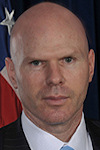 Peter S. Vincent — Principal Legal Advisor, U.S. Immigration and Customs Enforcement (ICE), U.S. Department of Homeland Security (DHS)
Peter S. Vincent — Principal Legal Advisor, U.S. Immigration and Customs Enforcement (ICE), U.S. Department of Homeland Security (DHS)
Mr. Vincent is the principal legal advisor for U.S. Immigration and Customs Enforcement (ICE), U.S. Department of Homeland Security (DHS). In this capacity, he oversees the largest legal program in DHS that comprises nearly 1,000 attorneys and 359 legal and mission support specialists who represent ICE in removal proceedings before immigration courts and the Board of Immigration Appeal. He also advises ICE enforcement entities on issues ranging from customs law to Fourth Amendment search and seizure issues.
Before joining the former Immigration and Naturalization Service (now ICE), Vincent was a litigator for the multi-national firm of Bechtel Corporation. He later became an assistant chief counsel with the DHS in San Francisco, concentrating his work on national security cases. He later served on the National Security Litigation Team in the San Francisco Office of the Chief Counsel for ICE where he represented the government in immigration proceedings involving terrorists and individuals who provided material support to foreign terrorist organizations. He also advised the local Joint Terrorism Task Force on issues relating to counterterrorism and foreign counterintelligence.
Vincent was appointed in November 2006 to serve as the U.S. Department of Justice's (DOJ) assistant judicial attaché at the U.S. Embassy in Bogotá, Colombia, and later was promoted to judicial attaché. While at the DOJ, he advised the DOJ, the U.S. Department of State, and other law enforcement and intelligence-gathering agencies on matters concerning extradition, terrorist organizations, and narco-trafficking. He coordinated nearly 500 extraditions to the U.S., including extradition requests for high-profile leaders of designated foreign terrorist organizations.
Vincent earned his bachelor's degree in political science with high honors from the University of California at Berkeley and received his law degree from the University of Virginia School of Law, where he served as the editor-in-chief of the Virginia Journal of International Law.